As per Statista, the artificial intelligence (AI) healthcare market, valued at $11 billion in 2021, is anticipated to reach $187 billion in 2030. This substantial growth implies significant transformations in the operations of medical providers, hospitals, pharmaceutical and biotechnology companies, and others within the healthcare sector.
Improved machine learning (ML) algorithms, increased data accessibility, cost-effective hardware, and the advent of 5G have contributed to the widespread integration of AI in healthcare, hastening industry evolution. AI and ML technologies excel at processing vast health datasets—from records and clinical studies to genetic information—outpacing human analysis.
In the private sector, healthcare leaders can invest in innovation and enhance healthcare. McKinsey's analysis suggests that implementing well-established interventions in care delivery, administrative simplification, clinical productivity, and technology enablement could yield a collective opportunity surpassing $1 trillion, potentially reaching $1.5 trillion by 2027. However, seizing this opportunity requires healthcare leaders to re-evaluate their approach to organizational growth and transformation, ensuring agility to capture the full potential of this evolving landscape.
The Dominance of Generative AI in Healthcare: Unraveling the Reasons
In the words of Mark Zuckerberg, "Generative AI is the key to solving some of the world’s biggest problems, such as climate change, poverty, and disease. It can potentially make the world a better place for everyone." Therefore, utilizing Generative AI for healthcare emerges as a compelling idea.
But what makes it so?
It's essential to recognize that Generative AI is poised to transform how healthcare organizations enhance operational efficiency and address the persistent challenge of patient engagement. The healthcare system grapples with a lack of alignment and coordination among various stakeholders, resulting in less-than-optimal healthcare interactions.
These factors underscore the significance of leveraging Generative AI in healthcare.
Positive Economic Impact of AI in Healthcare
Harvard's School of Public Health suggests that while it's still in the early stages, employing AI for diagnostics could potentially cut treatment costs by 50% and enhance health outcomes by 40%. This highlights AI's promising role in healthcare, offering substantial cost savings and improvements in patient well-being when utilized for diagnostic purposes.
Better Diagnostics and Treatment with AI in Healthcare
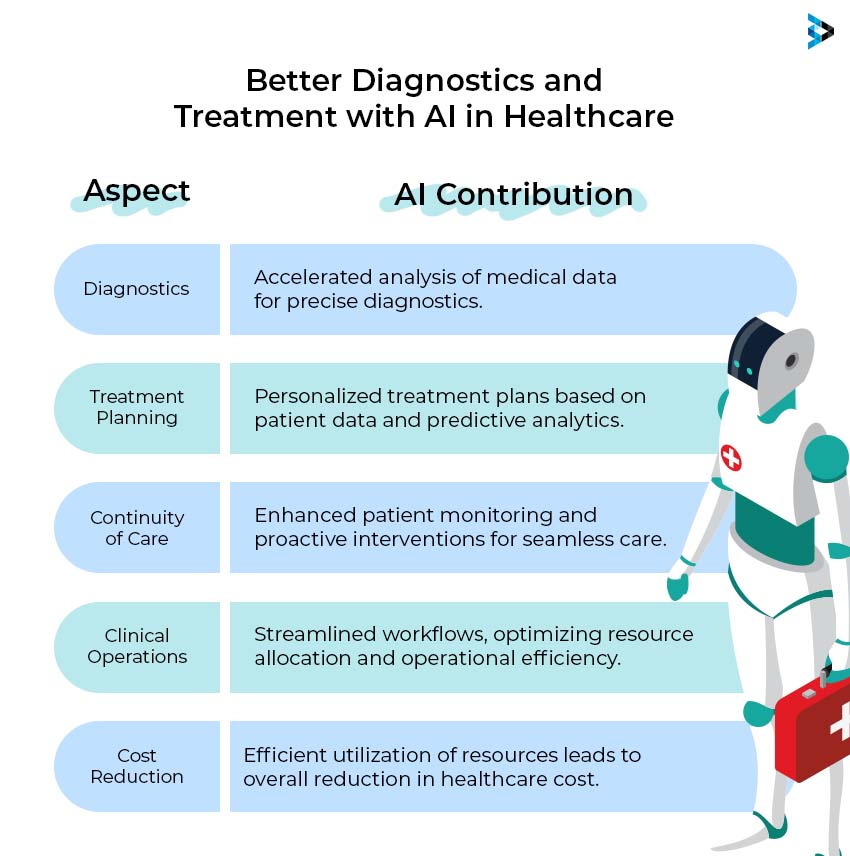
Enhanced Efficiency in Medical Processes
- Automation of Repetitive Tasks: AI streamlines routine tasks, minimizing manual errors and improving efficiency.
- Precision Medicine Implementation: Tailoring treatments based on individual patient data enhances the accuracy and effectiveness of medical processes.
- Data-Driven Decision Making: Analyzing vast datasets enables evidence-based decision-making, optimizing medical processes for better outcomes.
- Predictive Analytics: Anticipating patient needs and potential issues allows for proactive interventions, preventing delays and complications in medical processes.
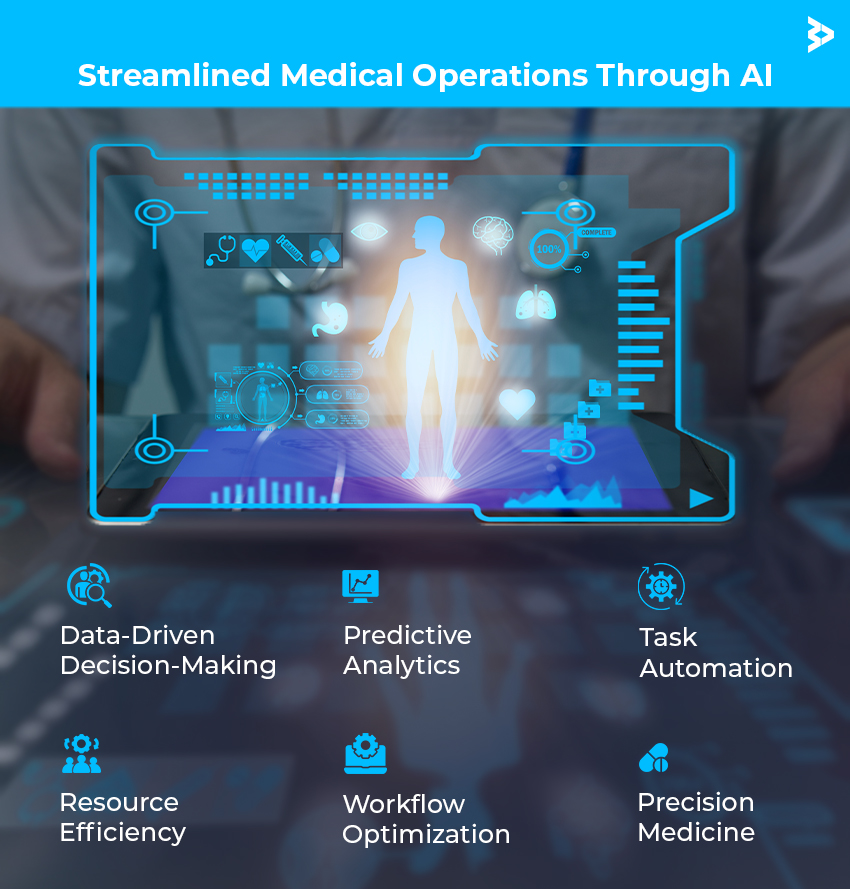
- Workflow Optimization: AI identifies workflow bottlenecks and inefficiencies, facilitating process optimization for smoother and faster operations.
- Resource Allocation: Efficient distribution of resources, including staff, equipment, and facilities, ensures optimal utilization and enhances the overall efficiency of medical processes.
Reducing Operational Costs in Healthcare
A McKinsey & Company study reveals that AI has the potential to automate around 45% of administrative tasks in healthcare, resulting in an annual cost-saving of $150 billion. Additionally, the Department of Health and Human Services suggests that AI could be pivotal in identifying up to $200 billion in fraudulent healthcare claims annually. These statistics underscore AI's substantial impact on efficiency, cost reduction, and fraud detection in the healthcare sector.
Enhanced Drug Discovery and Development
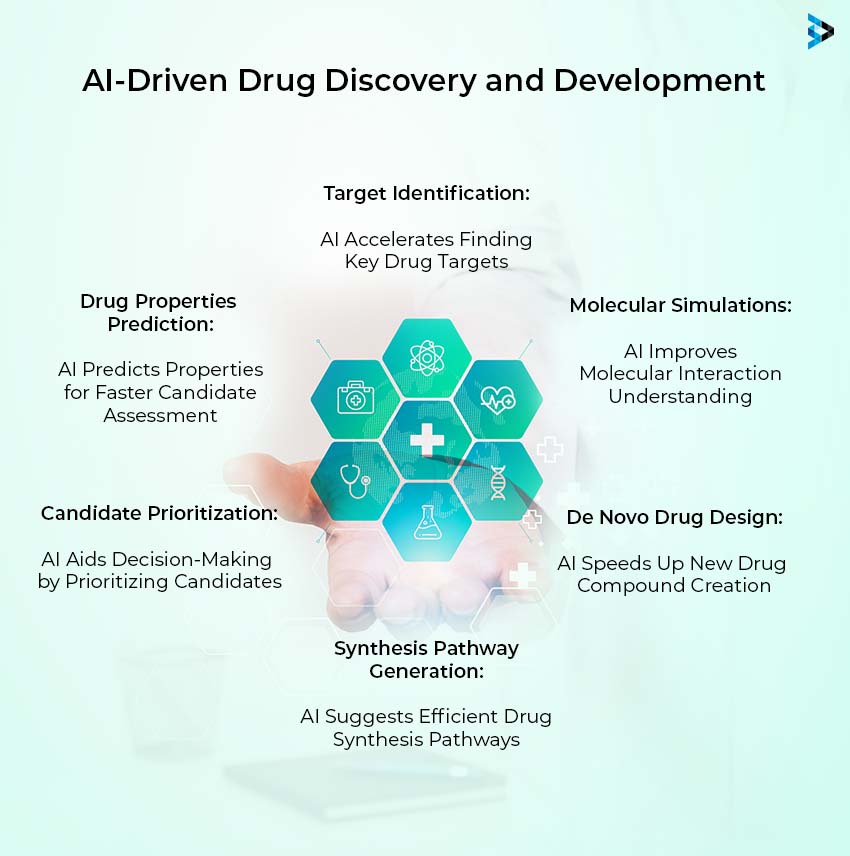
How Generative AI Functions in Healthcare?
Now, let’s dive into the practical aspects of building a generative AI solution. Follow these steps to embark on your journey of creating innovative and autonomous content generators.
Step 1: Clarify Goals
Begin by defining the purpose of your generative AI project. Identify the problem to solve, specify the content to generate, and identify the target audience. This clear objective will guide the project's development.
Step 2: Gather Quality Data
The success of your generative AI model relies on high-quality training data. Collect a diverse, well-labelled dataset relevant to your project, addressing any biases. Effective data collection establishes a strong foundation for success.
Step 3: Select Appropriate Model
Choosing the right generative model is crucial. Consider factors such as content nature, dataset size, and available computational resources. GANs are ideal for realistic images, while VAEs may suit diverse data distributions.
Step 4: Data Preparation
Prepare your dataset for training through normalization, handling missing values, and augmentation. Proper preprocessing enhances the model's learning ability and content generation quality.
Step 5: Train the Model
Optimize the model parameters during training to align with project goals. Experiment with architectures, fine-tune hyperparameters and monitor the process for adjustments. Patience and experimentation are key during model training.
Step 6: Evaluate and Validate
Assess your generative AI model rigorously, using the relevant metrics to measure content quality. Split the dataset for training and validation, iterating based on evaluation feedback. Validation refines the model for meaningful content generation.
Step 7: Deploy and Maintain
After training and validation, deploy the generative AI model for real-world use. Choose a suitable deployment environment, implement monitoring mechanisms, and plan for regular maintenance to address evolving needs responsibly and ethically.
Generative AI Applications in Healthcare Settings
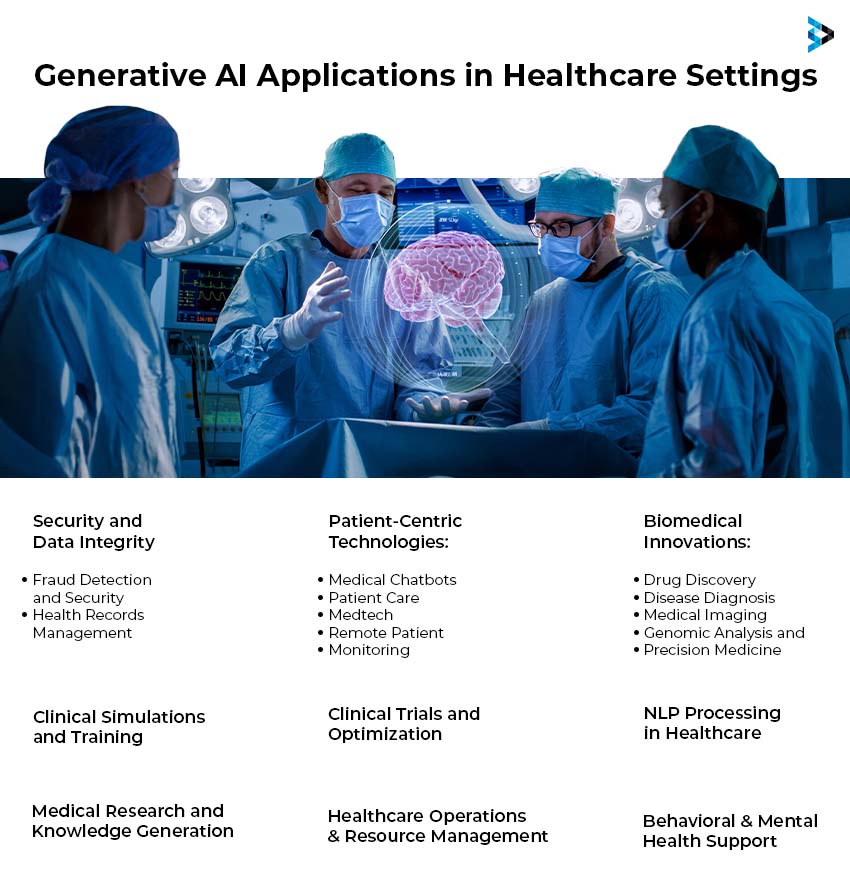
Drug Discovery:
Generative AI accelerates drug discovery by creating virtual compounds with desired properties. Researchers use models to navigate chemical space for novel candidates, learning from existing datasets and generating molecules with desired characteristics.
Disease Diagnosis:
Generative AI analyzes medical images (e.g., CT scans, X-rays, MRIs) to diagnose diseases. For instance, it can detect lung cancer from CT scans by learning patterns from a large dataset. It is also applicable in skin cancer diagnosis by identifying patterns from a dataset of skin images.
Medical Chatbots:
AI-driven chatbots enhance patient communication, providing real-time medical information and improving accessibility to medical advice and support for users.
Patient Care:
AI aids in creating personalized patient care plans based on individual health data. It facilitates remote monitoring and timely intervention for chronic conditions, improving overall patient care.
Medical Imaging:
Generative AI supports medical imaging, helping interpret complex scans and images for accurate diagnoses.
Medical Simulation AI is used in medical simulation, providing realistic scenarios for training healthcare professionals and refining their skills in a risk-free environment.
Medtech:
Generative AI plays a role in developing medical technologies (Medtech), contributing to medical device and equipment innovations and advancements.
Medical Research and Knowledge Generation:
AI accelerates data analysis in medical research, leading to faster discoveries. It supports knowledge generation by processing vast amounts of medical literature.
Personalized Medicine and Treatment:
AI tailors treatment plans based on individual patient data, enhancing medication prescription precision and minimizing adverse effects.
Clinical Trials Optimization:
Generative AI optimizes clinical trials by streamlining processes, identifying suitable participants, and enhancing efficiency in trial management.
Healthcare Operations and Resource Management:
AI aids in optimizing healthcare operations and resource management, improving efficiency in scheduling, resource allocation, and overall hospital management.
Remote Patient Monitoring:
AI facilitates remote patient monitoring, allowing healthcare providers to track patient health data in real-time and intervene promptly, especially for chronic conditions.
Fraud Detection and Security:
Generative AI contributes to fraud detection and security in healthcare by identifying anomalies in billing, patient records, and other sensitive data.
Health Records Management:
AI improves accuracy and efficiency in maintaining electronic health records, ensuring seamless data sharing among healthcare providers for better patient care coordination.
Behavioral Health and Mental Health Support:
AI provides personalized mental health support through virtual platforms, assisting in early detection and intervention for mental health issues.
Natural Language Processing in Clinical Notes:
AI-driven natural language processing enhances the analysis of clinical notes, extracting valuable insights and information from unstructured text data in medical records.
Genomic Analysis and Precision Medicine:
Generative AI contributes to genomic analysis and precision medicine, aiding in understanding genetic data for personalized treatment plans based on individual genetic profiles.
Generative AI Instances Transforming Healthcare Landscape
UMich Pioneers In-House Generative AI Development
The University of Michigan pioneers the integration of Generative AI (GenAI) in higher education with U-M GPT. Accessible to students, faculty, and staff across campuses, including Michigan Medicine, this custom AI tool emphasizes equity, accessibility, and privacy. U-M GPT offers academic information, answers questions, and provides personalized recommendations.
In collaboration with Information and Technology Services and Microsoft, the University introduced U-M Maizey and U-M GPT Toolkit. While some embrace AI in classrooms, others caution against its use in assignments. The University navigates thoughtful adoption, acknowledging the potential to augment, not replace, human capabilities. Students' opinions on AI's impact vary, reflecting the ongoing discourse in academia and creative fields.
The University of Pennsylvania Deploys Generative AI for COVID-19 Simulation
The University of Pennsylvania (Penn) embraces the integration of generative artificial intelligence (AI) models for teaching, learning, and research.
- Transparency: Clearly disclose when AI tools contribute to healthcare work products.
- Accountability: Validate AI-generated content with trusted sources, monitoring for accuracy and misinformation.
- Bias Awareness: Acknowledge potential biases in AI models, particularly when trained on unmoderated internet text.
- Privacy & Contracts: Exercise caution with personal data, ensuring compliance with data protection laws and secure contracts.
- Patient Privacy Protection: Strictly adhere to HIPAA regulations, preventing the exposure of patient data to open or public AI tools.
- Security Measures: Implement cybersecurity precautions, especially when using AI in code writing or technology creation.
- Data Scraping Risks: Consider potential data scraping, considering legal implications and consequences.
- Intellectual Property Adherence: Respect intellectual property principles, avoiding the upload of confidential information to AI platforms without protection.
- University Business Processes Oversight: Establish oversight and review mechanisms for AI's role in healthcare processes to ensure reliability and accuracy.
Benefits of Artificial Intelligence in Healthcare
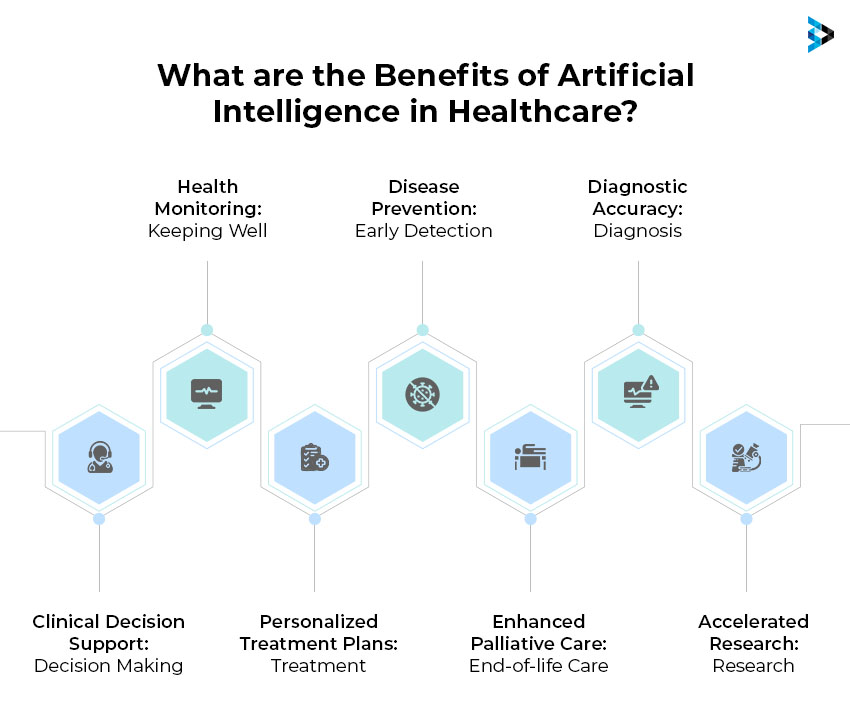
Improving Precision in Patient Positioning and CT Imaging
- Radiology Challenges: Radiology departments grapple with rising patient volumes and the need for consistent image quality.
- CT Workflow Enhancement: AI offers solutions for CT workflows, addressing efficiency and image quality challenges.
- Patient Positioning: AI-enabled camera technology detects anatomical landmarks, ensuring fast, accurate, and consistent patient positioning during CT exams.
- Mispositioning Risks: Patient mispositioning in CT can lead to increased radiation dose and image noise.
- AI Image Reconstruction: AI aids in image reconstruction, reducing radiation dose and enhancing CT image quality for improved diagnostic confidence.
Accelerating MR Image Acquisition
NYU Langone Health and Meta AI Research collaborate on fastMRI, utilizing AI to reconstruct rapid MRI scans, achieving diagnostic equivalence with traditional MRI. This fourfold acceleration can increase MRI accessibility, reduce patient wait times, and streamline imaging processes. In a knee MRI study, AI-reconstructed images proved diagnostically comparable to conventional scans, demonstrating the clinical viability of AI-accelerated imaging. The open-source fastMRI initiative facilitates broader adoption, offering a time-efficient alternative to traditional, time-consuming MRI examinations.
Simplifying Ultrasound Measurements
Recent strides in deep learning, pivotal in facial recognition and self-driving cars, promise a transformative impact on medical ultrasonography with Artificial Intelligence. While ultrasonography presents unique challenges, including operator-dependent imaging, success hinges on standardizing image acquisition, regulating qualifications, and incorporating clinical data.
Ultrasonography's intrinsic limitations, such as variable image quality, demand standardized static and cine image acquisition protocols. Deep learning, particularly convolutional neural networks, offers potential, with recent FDA-approved cardiac ultrasound AI software showcasing practical advancements. Moreover, ongoing research explores applications in thyroid, breast, prostate, and musculoskeletal diseases for enhanced diagnostic accuracy.
Facilitating Swift and Accurate Image Analysis for Radiologists
AI elevates the quality and precision of radiologic images, exemplified by its ability to:
- Enhance Clarity: AI algorithms reduce noise, improve resolution, and augment contrast, enhancing image clarity. Notably, AI-enhanced MRI images demonstrate significant improvements in soft tissue visualization.
- Abnormality Detection: AI-powered tools autonomously identify abnormalities, ensuring radiologists' attention is drawn to potential issues for early detection, preventing oversight of subtle irregularities.
- Precise Data Provision: Beyond detection, AI automatically measures and annotates specific structures or lesions, offering precise quantitative data. This aids in tracking disease progression and assessing treatment efficacy.
Promoting Interdisciplinary Collaboration in Cancer Care
AI, machine learning, and deep learning play diverse roles in cancer research and clinical care—supporting image analysis, predicting oncoprotein behaviors, and more. The National Cancer Institute (NCI) actively engages in AI research, spanning data generation, culture shifts in data sharing, interdisciplinary training, model development, and ethical considerations. This Perspective details AI applications NCI's current involvement and outlines five priority areas for future cancer-focused AI investments.
Navigating Hurdles: Generative AI Challenges in Healthcare
- Upholding Ethical Standards: Ensuring AI-generated content aligns with ethical standards, respecting privacy and sensitive healthcare data.
- Technical Proficiency: Overcoming the need for high technical proficiency among healthcare professionals to effectively utilize and interpret generative AI tools.
- Precision in Recommendations: Striving for accuracy and precision in AI-generated recommendations and diagnoses to enhance reliability.
- Transparency: Ensuring transparency in the interpretation process, allowing healthcare providers and patients to understand AI-generated outputs.
- Extensive Datasets: Meeting the demand for extensive, diverse datasets to train generative AI models effectively in healthcare settings.
The Future Landscape with Generative AI in Medicines
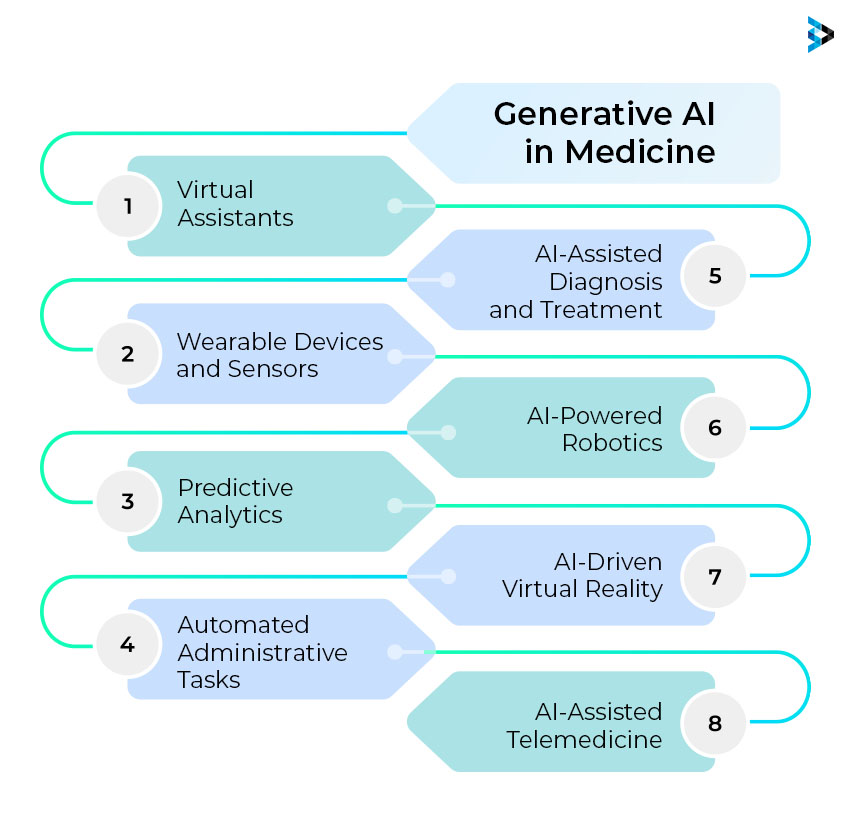
Virtual Assistants:
Intelligent virtual assistants for patient engagement, medical advice, and administrative support.
Wearable Devices and Sensors:
AI-equipped wearables for real-time health monitoring, early detection, and personalized insights.
Predictive Analytics:
Analysis of vast datasets for disease prediction, identifying high-risk populations, and proactive interventions.
Automated Administrative Tasks:
Automation of paperwork, appointment scheduling, and billing processes to reduce administrative burden.
AI-assisted Diagnosis and Treatment:
Rapid and accurate analysis of medical imaging, pathology reports, and patient data for precise diagnostics and tailored treatment plans.
AI-powered Robotics:
Integration of AI algorithms in robotics for precision surgery, rehabilitation, and enhanced patient care.
AI-driven Virtual Reality:
Immersive healthcare experiences through AI-enhanced Virtual Reality for medical training and therapeutic interventions.
AI-assisted Telemedicine:
Advanced diagnostic capabilities during virtual consultations, leveraging AI algorithms for informed recommendations.
Navigating the Future of Healthcare:
It goes without saying that health is crucial for everyone. When a doctor saves time, it means saving numerous lives. Incorporating Artificial Intelligence into medicine and seamlessly integrating it into healthcare devices ensures swift care services and improved patient outcomes. Moreover, Machine Learning applications and devices in healthcare are gaining popularity for swiftly detecting and analyzing diseases and health conditions.
The impact of AI in healthcare is undeniable—it will optimize care services significantly, thus enabling it to scale greater heights. To navigate this evolution successfully, you need the best professionals. Brainvire’s experts are here to guide you through everything. Connect with us now for more information and support.
Read more: Generative AI In ECommerce: Transforming The Online Shopping Experience
FAQs
- How Can Generative AI Assist in Improving Patient Outcomes?
Integrating Generative AI into digital health services enables a deeper understanding of evolving patient risk profiles, facilitating healthcare providers in delivering personalized and cost-effective care. An example of this is the implementation of a counseling chatbot, providing accessible healthcare services without prolonged waiting periods.
- Is Generative AI Secure and Compliant with Healthcare Regulations?
In spite of its promise, generative AI technologies pose recognized challenges related to data privacy and accuracy. These hurdles complicate adoption in tightly regulated sectors such as financial services, insurance, pharmaceuticals, and healthcare, giving rise to notable concerns that have been highlighted in recent news reports.
- What Are the Primary Applications of Generative AI in Our Specific Healthcare Field (E.g., Radiology, Cardiology, Oncology)?
Generative AI is essential in healthcare. Its applications include enhancing medical imaging, predicting and diagnosing diseases, expediting drug discovery, tailoring personalized treatment plans, automating administrative tasks, supporting telemedicine, ensuring health data security, engaging patients, and facilitating predictive analytics for epidemics and advanced research in clinical trials.
- How Can Generative AI be Integrated into Our Existing Healthcare Systems or Workflows?
Generative AI presents formidable predictive capabilities. Electronic Health Record (EHR) systems can leverage AI models to produce individualized predictions for patients, drawing insights from their medical history and current health status. It's akin to possessing a crystal ball, guiding healthcare decisions with the potential to enhance patient outcomes significantly.
- What Data Is Required for Effective Implementation of Generative AI, and How Do We Ensure Its Quality and Integrity?
Effective Generative AI implementation demands diverse healthcare data—medical images, electronic health records, clinical notes, and demographics. Ensuring quality involves comprehensive, accurate, and regularly updated records, complying with privacy regulations like HIPAA, employing robust security, precise labeling, ethical collection, and implementing a solid data governance framework to maintain integrity.
- What Level of Accuracy and Reliability Can We Expect from Generative AI in Diagnosis or Treatment Planning?
GenAI exhibits high accuracy in diagnosis and treatment planning, leveraging vast datasets to enhance pattern recognition. While it aids healthcare professionals with valuable insights, its reliability is subject to continuous improvement, iterative training, and validation against established medical standards.
- How Does Generative AI Impact the Role of Healthcare Professionals, and How Can It Augment Our Skills Rather Than Replace Us?
AI augments the role of healthcare professionals, serving as a powerful tool for data analysis, pattern recognition, and decision support. Rather than replacing professionals, it enhances their efficiency, allowing them to focus on personalized patient care, interpreting complex information, and collaborating with AI systems for more informed decisions.
- What Training or Education Is Required for Healthcare Professionals to Utilize Generative AI Technologies Effectively?
Healthcare professionals require tailored training programs to utilize Generative AI technologies effectively. This includes understanding AI principles, interpreting AI-generated insights, and integrating AI findings into clinical decision-making. Continuous education on evolving AI advancements ensures healthcare providers stay adept at leveraging these technologies responsibly and ethically.
Related Articles
Digital Transformation
AEM Implementation Cost Insight: Everything You Need to Know
Digital Transformation
AEM Implementation Process, Best Practices, and Tips
Digital Transformation
Odoo Pricing Guide: A Comprehensive Breakdown


